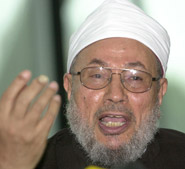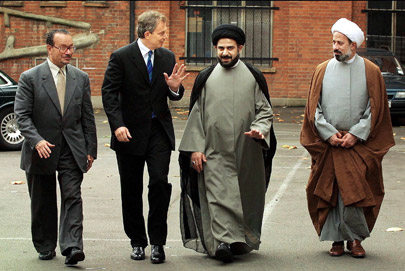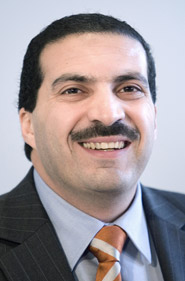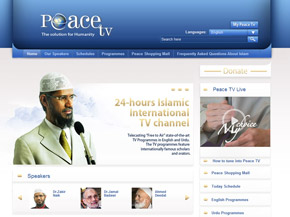In addition to other, more conventional social and religious movements, a number of networks built around religious scholars or popular preachers also have a lot of influence among Muslims in Western Europe. While these networks are in many ways separate and distinct from other groups, they often intersect with and draw on the influence of more formal movements and organizations, such as the Muslim Brotherhood and the Muslim World League. In particular, they are often what social scientists call “force multipliers,” meaning that they play a key role in expanding the influence of other Muslim movements and groups.
Snapshot: Networks of Religious Scholars
Stated Purpose/Goals
To promote the theology, legal opinions and other ideas of particular scholars or preachers.
Method/Activities
Some scholars have established research centers, foundations and media outlets that focus on religious education, charitable activities, and outreach to Muslims and the broader European society. Many scholars have sought to institutionalize their authority in Europe by participating in jurisprudential (fiqh) councils that provide religious legal opinions.
Representative Organizations/Key Figures
- Yusuf al-Qaradawi, a pre-eminent Sunni jurist based in the Middle East, oversees the European Council for Fatwa and Research and the International Union of Muslim Scholars.
- The al-Khoei Foundation, founded by the late Grand Ayatollah Sayyid Abu al-Qasim al-Khoei, is based in London and serves a growing diaspora of Shiites.
- Amr Khaled, an Egyptian preacher currently based in London, is a leading exponent
of something akin to “self-help” Islam. He also coordinates a network of charities in the U.K. and the Middle East. - Zakir Naik, the Mumbai-based founder of the satellite television channel Peace TV, is a popular — albeit controversial — speaker on Islam and comparative religion.
In many cases, these scholarly networks are built around a key figure – such as a religious scholar or media-based preacher – whose ideas and personal identity largely define the network. In other cases, religious influence emanates from a more formal institutional structure, such as Islamic fiqh (legal) councils – groups that provide religious legal opinions on a range of issues. But even within the fiqh councils, the overall orientation is still often defined by the vision and thinking of a particular scholarly figure or figures within the council.
There are a number of well-known Muslim scholars and thinkers who have significant influence in Europe today, including Swiss-Egyptian intellectual Tariq Ramadan, Cambridge University scholar Abdal Hakim Murad and Mustafa Ceric, the Grand Mufti of Bosnia.45 However, this case study focuses only on those scholars and preachers who have created networks of institutions and media outlets to propagate their teachings.
Yusuf al-Qaradawi
Of all the Islamic theologians with a significant profile in Western Europe, the most prominent may be Yusuf al-Qaradawi, a religious scholar now in his mid-80s who is a well-known media figure throughout the Muslim world. Al-Qaradawi is widely regarded by Sunni Muslims as one of today’s pre-eminent jurists. His views have become influential throughout the Muslim world through prolific publication and translation, and via media outlets such as satellite television and the internet.
Born in Egypt, al-Qaradawi received training and early employment within that country’s religious establishment, eventually graduating from Cairo’s al-Azhar University, a historic institution widely known as a seat of Islamic learning as well as a full-fledged university. Al-Qaradawi, who is closely associated with the Muslim Brotherhood, was jailed several times by the Egyptian government before finally leaving Egypt in the early 1960s and taking up residence (and citizenship) in Qatar as the dean of the faculty of religious law (shari’a) at Qatar University.46
Al-Qaradawi rose to mainstream prominence in the 1990s through a religious program on the Arabic-language satellite television station al-Jazeera. His willingness to discuss topics that are controversial in many Muslim countries, including sexuality and the role of democracy, soon won him a large and devoted following in the Arab world and beyond. In addition to his television show, he has written a number of well-known and widely circulated books, including Al-Halal w’al-Haram fi’l-Islam (The Lawful and the Prohibited in Islam), a pragmatic manual for living a modern life in accordance with Islamic law. He also founded the popular website IslamOnline, which has emerged in recent years as a popular forum for information and discussion of religious topics. While the English-language version of the website has been suspended since early 2010 (due to a reported dispute between its conservative owners in Qatar and its relatively liberal editorial offices in Egypt), many young Muslims living in the West have come to regard IslamOnline as a reliable source for explaining Islam’s relevance to contemporary issues.

Al-Qaradawi’s pragmatic approach to Islamic jurisprudence and his willingness to use various media outlets to spread his views have made him a popular figure with younger Muslims, particularly those living in Europe and North America. At the same time, some of his statements have made him a controversial figure in the West and led to him being banned from traveling to the U.K. since 2008. In a BBC interview, for example, he expressed his support for Palestinian suicide bombings in Israel, saying, “It’s not suicide, it is martyrdom in the name of God.”47
Prior to being banned from Britain, al-Qaradawi had used London as a platform to convene some of his global projects, such as the International Union of Muslim Scholars – an effort to combat the fragmentation of traditional religious authority by fostering a unified body of classically trained scholars speaking with a single voice on major religious and world issues.
Influence of Fiqh or Jurisprudential Councils
Al-Qaradawi and other Islamic scholars have sought to institutionalize their authority in Europe through the creation of several jurisprudential councils that provide religious legal opinions (fatwas) on issues ranging from Muslim participation in politics to appropriate financial lending practices. Al-Qaradawi, for instance, was instrumental in establishing the European Council for Fatwa and Research headquartered in Dublin. In addition, various local fiqh councils are found throughout Europe. These local councils are particularly prevalent in the U.K, where the question of shari’a law gaining recognized status within the British legal system has been a hotly debated topic in recent years.48
While the various fiqh councils garner attention, it is unclear how much day-to-day influence they actually have on the lives of most Muslims living in Europe. According to a 2006 survey by the Pew Research Center’s Global Attitudes Project, for example, a plurality of British Muslims indicated that they were most likely to turn to local imams when seeking guidance in matters of religion.49 Moreover, given the persistence of ethnic and sectarian cleavages within the European Muslim community, no single fiqh council has a monopoly. Al-Qaradawi’s European Council for Fatwa and Research, for instance, seems to have greatest influence within certain parts of the Arab Muslim community. South Asian Muslims, by contrast, are more likely to turn to a different network of scholars for legal opinions.
Sayyid Abu al-Qasim al-Khoei and the al-Khoei Foundation
Shiism, one of the two main branches of Islam, recognizes a fairly formal clerical hierarchy, in contrast with Sunni Islam, which tends to emphasize the authority of particular textual traditions and schools of thought.50 Many different Shiite groups can be found in Europe, including the Khoja community from South Asia (by way of Africa), Yemeni Ismailis and Indian Bohras. But most Shiites living in Europe belong to the dominant “Twelver” branch (ithna’ashari) that is found in Iran, Lebanon, the Arab Gulf states and Pakistan.

Unique to Shiism is the position of the marja’ al-taqlid (“source of emulation”), a figure viewed by Shiites as a living example of Islam. One of the most famous and widely followed marjas in recent times was Sayyid Abu al-Qasim al-Khoei, a Grand Ayatollah in the Iraqi holy city of Najaf who died in 1992.
He founded the al-Khoei Foundation in 1989 to serve a growing Shiite diaspora living outside the Middle East.
Based in London, with an office in New York, the foundation engages in a wide range of activities, including running schools and mosques for Shiites in Europe, particularly in the U.K.; translating key Islamic texts into English; providing guidance on practicing Islam in the West; providing chaplaincy services for Shiite prison inmates; and assisting community members in matters of marriage, divorce and funeral arrangements. Politically, the foundation opposes the theocratic government that exists in Iran, and it acts as something of a counterweight to efforts by the regime in Tehran to influence Shiites in Europe. Since al-Khoei’s passing, the foundation has generally followed the guidance of another important marja, Iraq-based Grand Ayatollah Ali Sistani.
In the wake of the 9/11 attacks in the U.S. in 2001 and the July 2005 bombings in London, the foundation has also pursued an agenda of outreach and dialogue to repair the image of Islam in the West. The foundation has also worked to advise British governmental bodies, including the Foreign Office and the Department of Communities and Local Government, on Shiism. The foundation’s leadership has also worked closely with the Mosque and Imams National Advisory Board, a recent British government initiative aimed at promoting good administrative practices at the country’s mosques, as well as preventing their use as hubs of Islamic extremism.
Rise of Media-Savvy Preachers

While traditional religious scholars have influence with some European Muslims, their authority is more limited with those Muslims – Sunnis and Shiites alike – who are young, urban and part of the middle and upper classes. However, there have been exceptions. For example, the popular Egyptian preacher Amr Khaled, currently based in the U.K., emerged some years back as the leading exponent of something akin to “self-help” Islam, combining advice and motivational slogans with religious stories from the life of the Prophet Muhammad.
Khaled later expanded the scope of his work and began organizing campaigns against social problems such as drug addiction. He also encouraged his followers to establish local charitable initiatives. Khaled’s style and approach have since been embraced by a new generation of aspiring preachers, some of whom, such as fellow Egyptian Moez Masoud, also have a following in Western Europe.
Another important figure with a European following is Zakir Naik, a Mumbai-based speaker on Islam and comparative religion. Founder of the satellite television channel Peace TV, Naik is a medical doctor rather than a classically trained religious scholar. While he is not an Islamic legal expert, Naik has impressed many young people (particularly young South Asians in Britain) with his ability to address contemporary issues using a combination of common sense and an encyclopedic knowledge of the Quran and other Islamic sources. He also has established himself as an Islamic polemicist, peppering his discourse with frequent comparisons between Islam and other religious traditions (he is equally comfortable recalling direct quotes from the Bible), always emphasizing that Islam is superior to other religions.

In June 2010, the British Home Office banned Naik from traveling to the U.K., citing “numerous comments” as evidence of his “unacceptable behavior.”51 On a widely cited YouTube video, for example, Naik voiced support for Osama bin Laden, called America “the biggest terrorist” and said the Taliban’s limitations on women’s rights might have some positive aspects.52 Later that month, the Canadian government also banned him from entering that country, where he had been scheduled to speak at a large Islamic conference in Toronto.
A New Kind of Islamic Movement?
For the most part, figures like Khaled and Naik do not have ties to established Islamic social or political movements. Indeed, some think their popularity speaks to a desire among Muslims in Europe – particularly young Muslims – to move away from what some people perceive as the rigid organizational hierarchies and highly politicized agendas of groups such as the Muslim Brotherhood and Hizb ut-Tahrir in favor of more pragmatic solutions to everyday problems.
There are also signs that younger generations of European Muslims are looking for a return to the doctrinal purity of “authentic” Islamic teachings based on classical scholarship. Indeed, this may help explain the recent upsurge of interest among young Muslims in Salafism – a highly conservative but generally apolitical school of Islamic thought that is frequently associated with religious influences emanating from Saudi Arabia.53 The theological influence of Salafism can be found in a number of Muslim groups, including the Muslim Brotherhood and the Tablighi Jama’at. But some scholars have argued that Salafism is influential enough in its own right that it should be regarded as Islam’s “new religious movement.”54


